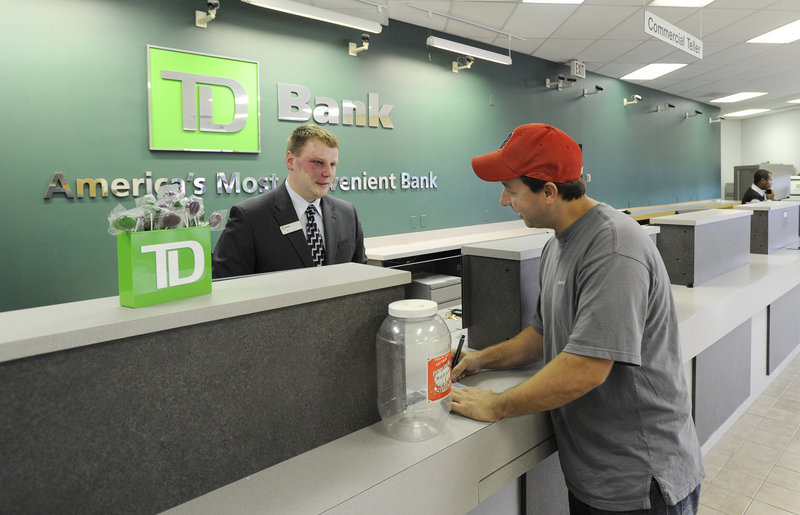PORTLAND – It’s only 8 a.m., and Donna Stevens is already on her second visit to TD Bank’s branch at Northgate. After cashing a check at the drive-up window, she decided to walk into the lobby to use the ATM.
Stevens, who lives nearby, said she likes to do her banking early, while her family is still in bed. She also visits the bank on Sundays.
“The hours are so nice, I can do everything I need to do,” she said.
Futurists, and some wishful bankers, figured everyone would be banking online in a cashless society in the early 21st century. That’s not happening. This branch, which pioneered Sunday openings years ago, now unlocks the door from 7:30 a.m. to 8 p.m. on some weekdays. It serves as a prototype for TD Bank’s decision this month to extend hours in 25 locations across southern Maine and stay open seven days a week at 14 of them.
The lowest-cost banking customers are those who use services online, or through ATMs and debit cards. But while remote banking is growing, it turns out that many customers want it both ways — high tech and high touch. The same people who pay bills on the Internet also want to sit down with a live person to discuss a mortgage or open a certificate of deposit, bankers say.
At the same time, overworked small business owners are having trouble getting to the bank during business hours. In other states, they’ve helped make Sundays a busier banking day than Tuesdays, surveys show. The term “banker’s hours” has little meaning in 2010.
“We view our business as a retail business, and we have to behave like one,” said Larry Wold, TD Bank’s president in Maine. “The expectation is, we’re available when people’s schedules demand.”
TD Bank is among Maine’s largest financial institutions, so its latest marketing venture has competing banks and credit unions watching closely. It’s too soon to say whether Sunday banking will catch on in Maine, although some top bankers say they’re skeptical.
Either way, TD Bank’s move helps show just how competitive retail banking has become, at a time when interest rates are so low that banks can’t beat each other up over who has the best CD or savings account.
“It’s virtually impossible to differentiate yourself on price,” Wold said. “The only sustainable way to differentiate is with service and convenience.”
TD Bank and its predecessors — Banknorth and Peoples Heritage Bank — were early adopters of Saturday banking and opening branches in supermarkets. These trends were accelerated in 2008, when TD Bank bought New Jersey-based Commerce Bank, which had a reputation in the industry for innovative customer service, including Sunday hours.
One popular Commerce Bank feature is now available at TD Bank branches: Penny Arcade, a free, coin-counting machine that operates like a child-friendly video game and offers free prizes. The bank hopes to win new customers when they cash in their receipts at the teller line, according to Gerard Cassidy, managing director of bank equity research at RBC Capital Markets in Portland. Cassidy said he witnessed the appeal of the machine recently at a Commerce Bank branch in New York.
“The Penny Arcade had a longer line than the teller line,” he said.
Extended hours and customer amenities make a bank more expensive to staff and operate, Cassidy noted. To make it worthwhile, banks need to offset those costs with growth in deposits, new accounts or other revenue, such as fees.
“Other banks in Maine will assess the success of this program,” he said. “If customers signal that they want it, or if banks are losing customers, they’ll do it.”
Some bank executives say they don’t see a great demand now for Sunday banking in Maine. They’ve even heard a few negative comments, they say, from customers who object to Sunday banking for religious reasons.
“We don’t expect a lot of people to be looking for that service,” said Yellow Breen, a senior vice president at Bangor Savings Bank.
At the same time, Breen said he appreciates the pressure banks are under to stand out in a super-competitive market, and expanded access and service are logical ways to respond.
“Banking is a service business and your best customers are those looking for a true relationship,” he said.
Credit unions are especially tuned in to the desires of their members, but John Murphy, president of the Maine Credit Union League, said he’s not hearing a strong call for Sunday hours.
Roughly 75 percent of credit union transactions take place remotely now, through ATMs, debit cards, online or 24-hour call centers, he said. But that hasn’t stopped the state’s credit unions from forming a shared network of 129 locations, with Saturday access and expanded hours that members can visit for the personal touch.
“Convenience is the name of the game in financial services today,” Murphy said.
“It’s every way you can respond to meeting the time needs of members.”
Staff writer Tux Turkel can be contacted at 791-6462 or tturkel@pressherald.com
Copy the Story Link
Send questions/comments to the editors.




Success. Please wait for the page to reload. If the page does not reload within 5 seconds, please refresh the page.
Enter your email and password to access comments.
Hi, to comment on stories you must . This profile is in addition to your subscription and website login.
Already have a commenting profile? .
Invalid username/password.
Please check your email to confirm and complete your registration.
Only subscribers are eligible to post comments. Please subscribe or login first for digital access. Here’s why.
Use the form below to reset your password. When you've submitted your account email, we will send an email with a reset code.